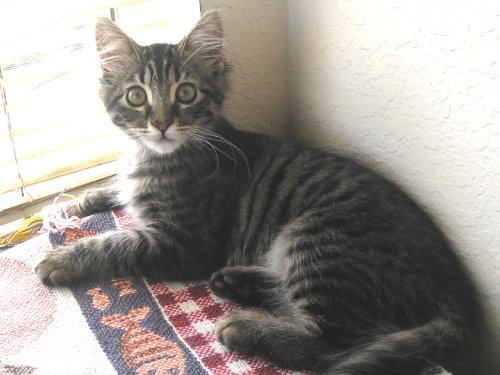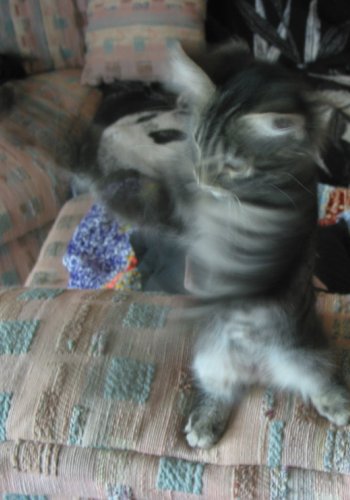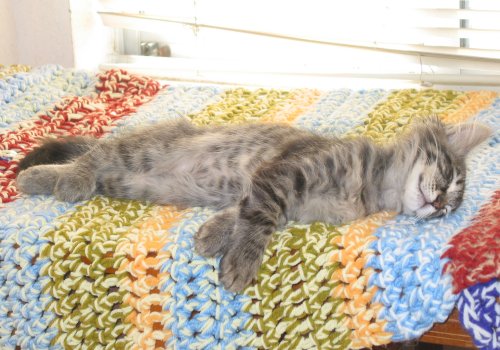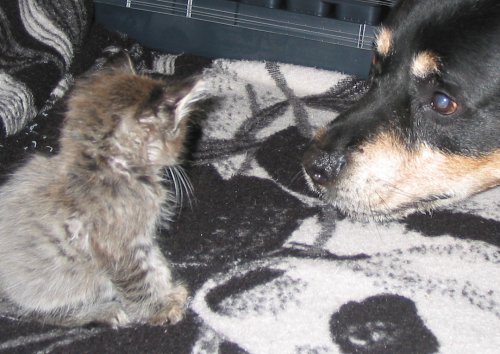June 25, 2009
A cat or a dog?
I have never thought dogs are smarter than cats, but according to a study described in The Guardian, Cats outsmarted in psychologist’s test, they are, at least in some ways. I’m not quite convinced, since I don’t fully understand the test myself. Either I need a better description or the dogs in the study are smarter than I am as well. What I found most entertaining about the article was the comments. We will defend our pets to the bitter end! I love both dogs and cats, and I’m not sure why humans feel a need to take sides as dog people or cat people. Frankly, I don’t care which are smarter, cats or dogs. Members of both species seem to know quite a bit about friendship, and have something to teach us humans….
So maybe the question should be: Which are smarter, cats, dogs, or people?
— Barbara @ 7:51 pm PST, 06/25/09
April 13, 2009
I’ve been in a horribly bad mood, mainly due to family troubles of the kind that make me feel helpless and small — the news of the death of my oldest brother, and my dad’s loss of independence due to a stroke. I’ve also had some just silly bad luck at home, little things like stubbing a toe so hard a few days ago that I worried it was broken (it’s still sore), straining my back lifting a bag of cat litter yesterday, frustration over the economic crunch that everyone is feeling, when I really could use a newer more reliable car. Why is it that bad news and events seem to come in these overwhelming groupings that feel as if they’ll never end — or, if that isn’t what’s happening, why is it that my mind seems to make even the small problems feel big, once it starts on a downward spiral?
Today I knew I needed to crawl out of this hole I found myself in. I’ve been avoiding the news, because that usually just makes me feel worse, and worse was definitely not what I needed. I know some people think that’s an unrealistic attitude, but I find the news unrealistic, in its focus on everything bad and very little good except nonsensical news about the personal lives of celebrities — people who would likely just as soon be left alone when it comes to personal matters.
I decided to search for some positive news on the Internet, and I found this story on a blog called Great Pet Net that I thought I should share in case anyone else could use a lift: Jasmine the Mother Theresa Greyhound. Dogs tend to have a healing way about them, all around, in my opinion. But this one is exceptional. She certainly had a distant healing effect on me.
It’s a beautiful spring day here. Flowers are blooming, in spite of the gopher that keeps eating them. (Our gopher loves California poppies and nasturtiums. What does yours like?) The The Hooded Orioles arrived early from Mexico, and one almost flew right into me yesterday, maybe because I was wearing green and blended with the plants. Later I watched three Red-tailed Hawks circle the sky above our house. Clouds sail across the sky today in a stiff, delicious ocean breeze. My cat Tara is always up for a game of chase or a tumble with toys. Someone I care about is playing Bach on the piano in the next room.
Yesterday I spotted a long, sinuous cloud in the western sky that looked like a Japanese dragon. I didn’t get a picture, but if you’re familiar with the animated film, Spirited Away, it looked a lot like Haku in his natural form as a river spirit.
Now that I’ve set my mind back in its more customary direction, at least for the moment, good things are beginning to happen inside me again, too.
Every now and then I find it necessary to keep a gratitude journal, to find at least three things each day that I’m grateful for to write about. I think I’ll take up that practice again for a while.
— Barbara @ 4:30 pm PST, 04/13/09
February 6, 2009
It doesn’t seem possible that we can already be one month and six days into 2009. I’ve been posting so infrequently that the blog barely has a pulse. But it is alive I assure you. It’s just been sleeping, dreaming if you will.
It’s raining and stormy today and I’m grateful for that. I think this is only our fourth big rain of the season so far. My cat Tara had a bath a few days ago on a warm, sunny, dry day that got to 80 degrees and seems to have become typical weather this winter. At least it’s been easy on the heating bill. Not so easy on the water bill or my sinuses.
I’ve been away from blogs except to post my ramblings about Tarot at Spirit Blooms. I’ve worked off-line at my other computer on artwork, read or posted on a couple of favorite Internet forums (more than I should), and searched out alternatives on- and off-line to spending money that I don’t have on books that I dearly want. I started out reading about Carl Gustav Jung; now I’m reading the writings of Jung himself, beginning with his autobiography written late in life, Memories, Dreams, Reflections . Still deep in my J. R. R. Tolkien adventure, I recently finished reading The Annotated Hobbit, and now I’m savoring The Lord of the Rings. I’m a little shocked by how much watching the movies in the interim has botched my memory of the original story. Still they’re excellent movies. One should appreciate each on its own merits, the novel and the movies as separate creative entities. To do the written story complete justice there would’ve had to be nine or more movies instead of three. Not that I would complain, but not everyone is the Tolkien fiend that I am. Up ahead I plan to continue with The Silmarillion
. Still deep in my J. R. R. Tolkien adventure, I recently finished reading The Annotated Hobbit, and now I’m savoring The Lord of the Rings. I’m a little shocked by how much watching the movies in the interim has botched my memory of the original story. Still they’re excellent movies. One should appreciate each on its own merits, the novel and the movies as separate creative entities. To do the written story complete justice there would’ve had to be nine or more movies instead of three. Not that I would complain, but not everyone is the Tolkien fiend that I am. Up ahead I plan to continue with The Silmarillion and The Children of Hurin. Perhaps others, who knows? I’m taking my time, reading mostly late in the evening before sleep, if I’m not too tired by then.
and The Children of Hurin. Perhaps others, who knows? I’m taking my time, reading mostly late in the evening before sleep, if I’m not too tired by then.
Eric Mayer mentioned, in his comment on my earlier post about rereading favorites, that he almost never rereads books. I’ve been the same way most of my adult life. I reread a lot when I was a teen and young adult, but at some point I realized there was plenty in print to read the first time around, and life was short. I felt that I’d miss out on too many other things if I spent my time rereading favorites.
I’ve changed my attitude about that again only recently. This has to do partly with some of the newer fiction that I’ve been dissatisfied with, partly with my budget, and partly with the tiny library here in town where the tastes of the librarians don’t seem to mesh with my own — or I’m just quirky in my reading tastes. I’m sure they have some Tolkien and maybe some Jung, but I’ve come to prefer to take my time and not feel constrained by a return date anyway. I tried writing reviews here for a while, and I found that if the book was a library book I had to return it too quickly, and if I tried to write a review after that, I kept wanting to refer to the book. If I like it, I want it to stay around for a while. I also tried our library’s on-line interconnection with an ebook download system, but that didn’t work for me. Old computer or aging human brain inside user? Either way it didn’t work and I didn’t want to waste time fussing with it. I wanted to read the book. You know, just open a cover and start reading. If something is going to slow me down I want it to be the savor of words.
That brings me to the fourth reason I’ve gotten back into rereading. Mostly it has to do with wanting to read slowly. I’ve given up on reading everything out there. I’ve finally accepted that’s impossible. I’ve decided to hone down my reading list and read what I love — slowly, and as many times as I want.
When I reread an old favorite I don’t have to be in such a hurry to get to the end. I already know how it ends. There is something to the first bloom of a new story, that first time through when it’s a path of discovery, recognition, and suspense. But this time I can pause and enjoy the language along the way, let the suspense build again slowly. My old favorites have language worth pausing for. The more commercial books today tend to be heavy on suspense and bizarre plots and twists, while they seem too often short on the kind of writing I savor. Many feel to me as if they’re written in too much of a hurry, or as if the writer didn’t even like the story he was writing. The secret to great writing, I think, is for the writer to so love the story that he’s reluctant to leave it. Chances are the reader won’t want to leave it either.
But then I’m not a hurrier, never have been. I think it’s too easy to get into an “I’ll miss something if I slow down” mindset in our day and age, though it’s a valid concern to some degree. In the work world, one must hurry enough to show up when needed, and if one slows down one is in danger of not getting important work done, of missing opportunities, or of not being able to do one’s job anymore because one hasn’t kept up with hyperactive technology. There are sometimes valid reasons to hurry. I don’t want the emergency room team to dawdle, or firefighters to take their time arriving at a fire. For readers who want to keep up, there’s such a huge amount being published, in spite of aspiring writers’ concerns that no one is publishing what they write, that it’s easy to think one has no time to reread or to read slowly the first time. There are also such a great number of people who want to be writers that it doesn’t appear we’ll ever have a shortage of reading material, even very good reading material leaving out the bad. It’s a crowded world full of people with something to say, many of them excellent writers.
Still I think we miss out on too much by trying to do or read everything. I’m not well-read, mainly because I’m a slow reader. Maybe that’s why I appreciate books that take a long time to produce. I can sense the love and time that was put into them. I can linger, relish, and wonder why. I can spend a relatively equal time enjoying them, and feel gratitude that the authors took the time to do it right.
Tolkien took something like 13 years to write The Lord of the Rings between 1937 and 1949. He took longer, when one considers all the thought prior to beginning it that he put into creating the world of Middle-Earth, from the time he was a boy, and the time between 1949 and 1954 that he worked with his publisher to get everything just right. That time shows. And it’s not as if by taking that long he missed out on sales, which seem these days so unforgiving of anyone lagging behind. The only time any of his books went out of print was during Word War II and the after-war years, when paper was rationed in England. Oh, and there was the problem of some proofs being destroyed in a bombing or a fire (I don’t remember which) that caused further delay in getting one edition of The Hobbit back into print. Of course one important factor in his print longevity was in being Tolkien. There have been many imitators and, as Eric seemed to hint in his comment, most imitations have not held up very well. Time is, I think, one reason.
I’m certain that the biggest problems with many books is that they’re devised and written in too much of a hurry, and because they aren’t true to the writer’s own creative promptings. I can see some publisher urging a writer to create something like Tolkien wrote, but to do it right now. Imitation done in a hurry can rarely hold up to the proper process of creation. Sometimes, but not usually. Imitation as a whole is an iffy and questionable practice. Readers may say they want another story like The Lord of the Rings, but they’re not saying they want an imitation. They want more Tolkien, and that’s simply the best possible compliment to the original creator, not to any would-be imitator. Perhaps we sometimes, as readers, make the mistake of confusing the two ideas ourselves and go looking for another Tolkien when we should be looking for something else that’s new and fresh, and over which someone labored long and lovingly.
It’s been said that most of a writer’s work doesn’t take place at the typewriter or keyboard, or even necessarily with paper in hand. It happens inside the mind of the writer. I personally think every writer’s workspace needs a comfy couch, or a bed, and a window with a view of a natural setting or garden, as well as an immense library. I also think it’s safe to say that most great fiction writers have lived what they write. By that I don’t mean they’ve experienced it in physical reality. I mean they have a fertile and active imagination, an ability to visualize the experiences they haven’t actually lived. A relentless imagination at that. We use our imaginations to read, but the writer uses his imagination far more, over and over again, actively reliving the scenes he writes in his mind, working them out until they feel right, until he’s ready to translate them into written language. They get to know their own unconscious realms and facets of their own characters, as well as the archetypes of the collective unconscious, even more than we do ordinarily when we dream at night.
Now I know that some writers create at the keyboard on the fly. I’ve done that too. But the stories I’ve written that I felt best about were usually those that I had in mind for a long time before I dared to put any words down. They were an integrated collection of many things that occurred to me, including some fantasies, day dreams, things I wondered about, and even whole scenes, characters, or settings that occupied my mind well before I realized they’d formed anything close to a story worth sharing or writing down. Some were ideas I couldn’t put away because they begged to be told.
Fast writing may be part of the problem. I once rewrote a novel (Snow Angels) in the course of a few weeks, retyped the whole thing from scratch, from my head. But that story had been in my mind for a long time, in various forms, and even on paper in a few forms, before I did that. I’ve never taken part in NaNoWriMo, but I think it is possible for it to produce something of value, provided there’s something already percolating in the writer’s mind before they begin, perhaps for years before they begin typing it out. I’ve done fast writing exercises, and I know they have their value. But I wonder if the trend in fast writing is the reason so many new books I read leave me flat these days.
There is fast writing that’s great, and there have been many great prolific writers. But if we make the mistake of thinking their greatness lay in their proliferation, we do them a disservice. The secret to great writing also doesn’t lie in taking forever to produce something. I’m sure there are plenty of slowly written pieces of rubbish passing for fiction. But prolific writers are the exceptions to the slow writing rule, I think, and like Mozart’s music, great fast writing is great for other reasons than its speed of production or lack of revision. Of course everyone should write at their own speed, but fast writing of a single draft usually requires slow thinking up front, and long, slow revisions afterward. If one doesn’t take the time to do it right, to follow through, to consider it worth some effort, then even that smaller portion of fast writing time is wasted, not to mention the time anyone else takes to read the result. If it’s not worth spending lots of time writing, then maybe it’s not worth reading either.
In spite of how long Tolkien’s work has remained in print, it’s still possible that work of this kind is best done for oneself, with any idea or intent of publishing as a mere afterthought. One should, after all, consider oneself worth writing well and respectfully for. From what I understand of Tolkien, he only shared what he created with a few colleagues, friends, and his children, until the friend of a friend mentioned the possibility of publishing The Hobbit. Maybe that’s why it’s so good. He took time to shape and polish it to be what he wanted for himself and those he loved. Only after that did he shape and polish it for publication. Surely that provided him a great deal of satisfaction in what he wrote, regardless of whether strangers in his own land or across the pond liked it later on. He was also a real-life expert regarding myths of a world similar to the one he created and regarding the language he used to create it. But was he an expert who happened to come up with a story he was best suited to write, or was he a writer in the making, even as a child, who lived in his head creating a world first and who worked all his life to become expert at just what he needed to recreate that world on paper? Either way, he took his loving time about it, and that’s a good thing for all of us. After all, what’s the rush?
— Barbara @ 1:55 pm PST, 02/06/09
December 9, 2008
It was much smaller in scale, in terms of lives lost, but the F/A-18 crash in University City yesterday brought to my mind another crash, while I watched the news on TV yesterday, horrified — the crash in North Park in 1978, when a Cessna collided mid-air with PSA Flight 182. Both happened in residential neighborhoods, and there were many witnesses, including this amazing account by a mail carrier, to both planes going down right over homes. No one who lived in San Diego at the time could forget that other crash 30 years ago, and the one yesterday touched many people deeply as well.
My heart goes out to the family and friends of the four who died yesterday, a mother, grandmother, and two baby girls, as well as to those who’ve lost homes or sustained other damage, to the neighbors and students at nearby schools traumatized by the incident, to the pilot, and to all the rescue/emergency workers who responded. It could’ve been much worse, but that doesn’t change or lessen the impact of this tragedy on so many lives.
— Barbara @ 5:28 pm PST, 12/09/08
July 29, 2008
because we brought him home on the 4th of July. But we always called him Indi. I started out spelling his nickname Indy, while his “dad” started out spelling it Indi. But it always sounded the same to him.
We never called him Independence, and come to think of it he wasn’t independent. He made friends everywhere he went, and in his first obedience class he was voted No. 1 Puppy. He never chewed up anything he wasn’t supposed to, but he knew what to do with a rawhide bone, and in his prime he could demolish a large one in short order. As a puppy he surgically removed squeakers from toys, and wore out several plastic balls until they no longer squeaked.

Green was his favorite color. I know dogs are supposed to be color blind, but Indi always preferred the green balls to the blue ones or red ones. We tested this, several times.
He liked to be wherever we were, and most recently he was my gardening buddy. He wanted to follow me outside whenever I worked in the back yard, even when he was too old and sick for it to be much fun for him.

Indi died last night, after 10 years of faithful, loving companionship. He was the best dog we’ve ever known, and we feel honored to have had the chance to live with him.
We miss you, dear friend, and we won’t be at all surprised if you’re voted Number 1 Puppy in Heaven.

— Barbara @ 6:46 pm PST, 07/29/08
July 11, 2008
Then my computer crashed for a couple of days. Here they finally are:
Tara at nearly 15 weeks and 3.5 lbs, in a rare moment when she’s sitting still —

Tara as a blur (her normal state) —

The first tomato? We’ll see.

In case anyone is thinking that my fresh interest in gardening means I have a lush, fully planted yard, I have to confess here that these photos are a cheat. They don’t show the ground still barren of any planting. We live on a granite hill, partly decomposed and partly still-composed boulders. We also live in a semi-arid, overly populated part of the country, so water isn’t cheap. I’m also lazy. I’ve planted around what my husband already planted or nursed back to health, and that might make me appear to be a more productive gardener than I am. But I love my few plants, they’re producing, and I have big plans for next year, so we’ll see.


As you might have guessed, part of my garden is for the birds, though I like sunflower seeds too, so even the sunflowers aren’t entirely for the birds.
I’ve read somewhere that there’s a German paper company that makes fine stationery from sunflower stalk fibers, and that gets an artsy-craftsy person like me thinking. . . .


Of the seven or so sunflowers growing in our yard right now, most face east, most of the time. There’s one near the front door that faces the door, to its north, which means I see its shining face as soon as I walk outside. It’s had the same ladybug on its bloom (below) for three or four days now. I hope she’s taken up residence and plans to take care of it and keep it pest free until it’s finished blooming.

Then there’s this one (below), which faces the southeast (back) corner of the yard. Is it an errant sunflower that thinks it has to stand in the corner — my generation’s equivalent of a time-out? Or does it like the chattering of the caged parakeet the neighbors down there sometimes leave out on their patio during the day? Maybe it’s made friends with the bougainvillea. I don’t know.

I almost forgot one of my favorites, a picture of the quintessential Tara — at least when she’s mellow and not stalking whatever prey or toy or window screen is available to do her destructo-cat number on. This is from two weeks ago when she still had a little kitten fluff —

— Barbara @ 9:13 pm PST, 07/11/08
May 17, 2008
I’ve always been a cat person, and my spouse converted soon after we got together. Our dog is a cat person too, since he grew up with cats. Ever since Emily died in August, Indi has been lonely and bored. He started acting like a very old dog. We’re apparently boring, depressing people for a dog to own unless he has a cat around to spice things up, and he’d known and loved Emily all his life. Well, things got spiced up again yesterday, but good.
Meet Tara, named for the Goddess Tara, revered in Tibetan Buddhism as well as in Celtic lore. Cats are supposed to be worshiped, right? Tara thinks so.


In the second photo she’s making friends. Any time she ventures near her new doggy friend she receives a great big juicy kiss on the face, which of course any cat should be delighted to receive. Especially if she just finished washing the last kiss off her face. Indi also loves to get swatted in the face. I think Emily taught him to see that as fun, as a former owner had Emily de-clawed. Indi realized earlier today that Tara comes fully loaded, though she only swats when she’s playing.
We were a little concerned about the introduction, since lately Indi’s become enthusiastic about chasing strange cats out of his back yard. But when his new kitten was introduced as a member of the pack, he happily reverted to baby sitter. Tara took to him with no hissing, having been born into a home with dogs. She knows the drill. Avoid doggy kisses by cruising behind furniture and darting under beds. Especially after the doggy has just taken a long drink of water. (Very drippy business.) Indi is getting old, which you can tell by all that white fur on his face where it used to be mahogany. But having a kitten around has put a smile on all our faces and zest in our steps. (Handy when there’s a kitten darting about underfoot.)
— Barbara @ 4:42 pm PST, 05/17/08
January 16, 2008
In a couple of weeks, groundhogs will make their yearly predictions, though I’m not sure a prairie dweller afraid of its own shadow is a very reliable sign of the turning seasons. I’ve begun to wonder if we’ll have an early spring, though. The weather has turned sunny and warm, and we haven’t needed an extra blanket for the past few nights.
Weeds have cropped up all over our yard, making everything green, even if it isn’t the commonly acceptable form of green. When the weeds first sprouted they were beautiful, and in some open, flat parts of the yard, from a distance you would almost think we had a lawn. We don’t, and now that they’re larger, from a distance they just look like a bunch of weeds.
We found something new and interesting under the pine trees. It was a strange vine, not anything I recognized, but vaguely reminiscent of a Cucumber, or maybe some variety of Passionflower. (Click photos for larger views.)


It had grown a lot by the time we noticed it, and was on its way to spreading all over that section of the yard, sending out long, tightly curled tendrils that took hold of whatever was in their reach.


It had already started up one pine tree.

I looked it up on the internet and didn’t find anything conclusive, at least not at first. Nope, not a garden-variety Cucumber, and thank goodness it doesn’t appear to be a Kudzu Vine. It wasn’t a Mandrake, which sort of disappointed me, as a fan of Harry Potter movies, though I don’t particularly want a plant that will scream at me.
Possibilities came and went as I searched for vines with multiple-lobed leaves, even the possibility that it was some kind of wild grape, which it wasn’t. One type of vine that seemed to come close was the Bitter Melon, also known as Balsam Apple or Balsam Pear. That narrowed my search to various forms of gourd or Cucurbitaceae, such as Hodgsonia, or Luffa, or the much more likely Chayote, which is sold in our local markets. But the leaves weren’t right for Chayote. The strongest possibility I’ve come up with so far is some variety of Coyote Melon or Coyote Gourd, which grows wild in our region.
If you know for certain what this vine is, please let me know.
How it got there is the easy part of this mystery, and would be even if I’d never seen a house finch scatter seeds. Our local scrub jay friends are always hiding things in the needles that collect under our pine trees. It’s a favorite place to store their seeds, nuts, magic beans, and whatever else they hoard for later, usually scrub oak acorns, or peanuts people have fed them. Last summer, while we trimmed the pine trees and cleared out a thick mulch of pine needles, one scrub jay kept fussing over our activity, and every now and then he darted in to rescue some of his treasures. In some years we’ve had volunteer sunflowers sprout there and grow to full height.
NOTE: The pictures that follow are from past summers, not this winter. Even here, we don’t ever see sunflowers blooming in January.


Out front, we have an entire patch of some kind of creeping yellow daisy that came up there one year, probably also carried in by birds. We water it now and then, so although it dies back each winter, it returns to open a bright patch of yellow flowers every summer, next to our old pickup.


In any case, the strange vine has been eradicated, so we won’t have any cries of “Feed me, Seymour!” coming from under the pine trees, and it won’t grow so large as to strangle a pine tree. Jack won’t have to climb up the beanstalk and see if there’s a giant living up there. Good thing, too, because no one named Jack lives here, so we’d have to pay Jack to do that. Still, I hope we didn’t kill something we would’ve liked. Sometimes the birds bring us weeds, and sometimes they bring us gifts that we enjoy for years.
Maybe we will have an early spring, maybe not. I’m in no hurry. I certainly don’t look forward to the hottest part of summer. But a long spring would be nice.
— Barbara @ 6:20 pm PST, 01/16/08
January 1, 2008
Happy New Year!
Today entered with a beautiful sunrise and left with a gorgeous sunset. What more could we want for the first of the year?
I’ve come to think that the day I enter a new year should be almost like any other day, that making resolutions for the entire year ahead isn’t really sensible. Anything can happen in the course of 12 months, and sometimes our focus changes completely due to forces outside our control. So instead of thinking about resolutions, I spent a lot of time in the past few days reviewing not only this past year, but my entire adult life. The whole-life review has partly to do with a journal project, basically sorting through a mass of accumulated pages from years of personal journal keeping and coming up with a way to edit them down to their essence and organize them, to preserve the memories without all the bulk. In the process I’ve read back through pages that I wrote at 18, 19, and 20 years of age. Wow, what a kid I was — and still am, in some ways. But it made me think a lot about choices and where they lead us, and how we define happiness and success at different times in our lives, especially how our focus shifts, sometimes suddenly, and what we spend our thoughts on. It made me face some of my regrets that I hadn’t considered or thought about in years.
Those regrets include hurting people’s feelings in any way — and I’ve committed some doozies, usually by accident but in hurtful, unthinking ways just the same. I regret changing my college major from English, leaving college without a degree, spending too much time in college distracted by and pining over young men, imagining potential relationships where it should’ve been obvious to me they didn’t exist, joining a church at 19, which distracted me even more from school and may have been what finally drew me away from it altogether — there were boys there (gag me with another repetitive, pining journal page) — and taking religion too seriously for even those few years, mistaking it for a deeper form of spirituality that it was not. Let me say right here, young women put far too much emphasis, or at least we did back then, on finding mates. It’s absurd. Though I eventually did, and have been with him for going on 25 years now, he wasn’t one of those responsible for distracting me in school, so you see all that pining back then was a complete waste. Later in life, I regret not buying a house sooner (though I’m not sure how that would’ve been possible earlier), not taking more vacations when I could afford them, buying even half of the magazines I ever purchased, spending rather than saving most of the excess I finally earned for a few years (and still not spending it on vacations), not buying a new car before I retired, and not giving up on being a novelist sooner. I’m serious about that — seven novels with no sale is too much — enough already!
In spite of those regrets, I’m pretty happy with most of my choices, especially in my spouse, and even in some of the jobs I didn’t like at the time but which were worth the opportunities and the friends they brought me. In fact all my experiences, including many I regret, taught me something of value.
Regrets are a waste too, so I won’t dwell on them, or on dreams or plans for the future. Instead I want to focus on now, on how I’m doing and what I plan in just the next few days or weeks. If there’s anything else I need to focus on more of the time, at this point in my life, it’s the same things I think we should always focus on, all our lives. Most of the people I know spend too much worry on whether we’re good enough, or what we’d change about the past. And some of us spend too much time worrying what others should do, or what should happen that’s out of our control, to make us happy. So I’m reminding myself yet again:
Be happy with myself, as I am
Don’t worry whether others like or approve of me
Treat myself and others kindly and with respect
Don’t let anyone tell me how I should live my life, and don’t tell anyone how to live theirs, as long as they’re not harming anyone
Stand up for myself and for the rights of others
Love life, and live it with passion and an open mind to possible outcomes
Have no regrets — let them go
Follow my bliss and enjoy seeing others follow theirs
Own my life
Don’t worry at all, let tomorrow take care of itself
Learn from everything
All my best regards to you for 2008, and good luck in the coming year.
— Barbara @ 6:43 pm PST, 01/01/08
July 9, 2007
Gloria Steinem: In Defense of the ‘Chick Flick’:
“I propose, as the opposite of “chick flick,” films called “prick flicks.” Not only will it serve film critics well, but its variants will add to the literary lexicon.” (read article)
Maybe the term “prick” is too strong. It’s not the word I would’ve chosen, yet it answers the fact that a lot of women are put off by the tone and expression, if not the word, used when we hear the term “chick flick.”
Steinem’s editorial reminds me of something that occurred in a “Modern Fantasy” literature class I took, back in the seventies, when Mary Stewart’s first two Merlin and Arthur novels, The Crystal Cave and The Hollow Hills, were recent bestsellers. One of the young men in the class was so taken with them, he asked what other books Mary Stewart had written. I told him she’d written mostly romantic suspense in the past. I had an entire collection of her books at home, older hardcover editions gleaned from thrift store shelves. I thought when he expressed an interest that here was another new fan. But when the young man heard the word “romantic,” he took on a look of utter distaste and lost interest.
Some female mystery novelists still publish today using their first and middle initials rather than their full first names, in order to stretch past that still-existent gender barrier in many male readers’ minds, a practice reminiscent of the Brontës publishing under masculine names. One would’ve hoped that by the time this century rolled around we’d have advanced further. I don’t have statistics on this, but I’ll hazard a guess that there are more women who read and write fiction containing a predominately masculine point of view than there are men who read or write fiction containing a predominately feminine point of view.
Yet I know women, myself included, who enjoy a good action film, of the type once considered a favorite of men. Why is it that women, both in their reading and writing, as well as in movie preferences, might more readily cross old gender barriers?
Mind you, many men do take an equal interest in less violent or less action-oriented movies and books, and I admire men who are open to genres and interests considered historically feminine. I also admire women who open up more to interests previously considered masculine. More women today are sports fans than ever before, and don’t restrict their interests, as I do, to figure skating. My lack of interest is mostly due to bad experiences in physical education classes — I was that awkward, non-athletic kid always picked last for the team. It has nothing to do with my admiration of any outstanding achievement, physical or otherwise, and I enjoy watching good sports-related movies.
What is it that continues to keep some men from enjoying what they term as “chick flicks?” Is it that they truly don’t enjoy more thoughtful, slower-moving, or less action-oriented stories, once they give them a chance? Or is there another reason? Is it adrenaline addiction? (Understandable, among men and women, in today’s world, though perhaps best not encouraged.) Is it fear of what their friends will think? I’m trying not to make assumptions here. I’d really like to know, especially as a female writer trying to sell my fiction.
We all have types of stories we don’t like, or even parts of movies we like that we could do without. I personally back away from anything about child abductions, gangster movies that are overly violent onscreen, comedies that resort to tasteless bathroom humor (bathrooms have doors for a reason), and horror with too much blood and gore added for shock value. As far as I’m concerned, vomit and excrement belong off-screen. There’s enough of them in real life, and they’re not entertaining. They’re certainly not the kind of realism I’m looking for in a story.
I can understand someone not liking romance, even though I usually enjoy it provided it’s not overly sappy. But no one’s personal preference for certain types of stories and not others explains why we need the term “chick flick,” and especially not why it so often seems to be used as a derogatory term. Do the men who don’t like “chick flicks” prefer movies with only men? Is that what it boils down to?
I’m reminded of a line from Frank Herbert’s Dune regarding taking the “waters of life.” It mentions the place in their minds the Bene Gesserit mother superiors (women) fear to go, a place they believe only the fabled Kwisatz Haderach (a man) can access. The Kwisatz Haderach, once he accesses that place, becomes a superior being destined to lead his people to freedom. I wonder about the allegory Herbert intended, if any. Is there a place like that inside the female psyche, where some of the toughest men fear to go? Is that what they fear about “chick flicks?” Will they gain power if they find a way to access that, or will they lose power, possibly even die, as many men did who attempted to become the Kwisatz Haderach? Or will they simply gain a broader understanding of life and the world around them? In that case, maybe it’s worth a shot.
Gloria Steinem makes an interesting observation about power, and about nouns and adjectives in labels:
“Just as there are “novelists” and then “women novelists,” there are “movies” and then “chick flicks.” Whoever is in power takes over the noun — and the norm — while the less powerful get an adjective. Thus, we read about “African American doctors” but not “European American doctors,” “Hispanic leaders” but not “Anglo leaders,” “gay soldiers” but not “heterosexual soldiers,” and so on.” (read article)
— Barbara @ 1:35 pm PST, 07/09/07




























